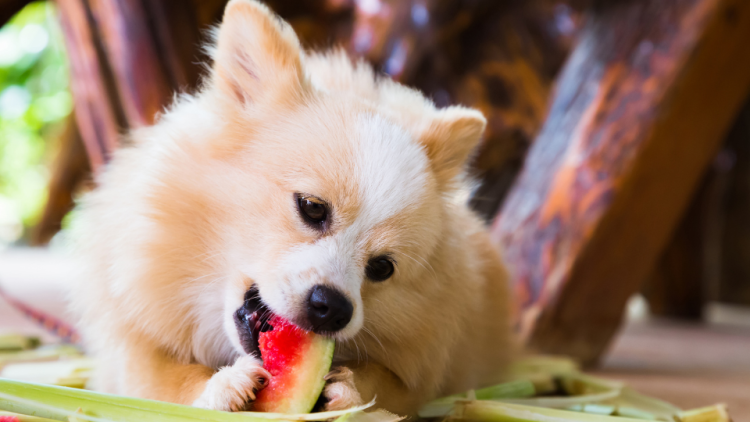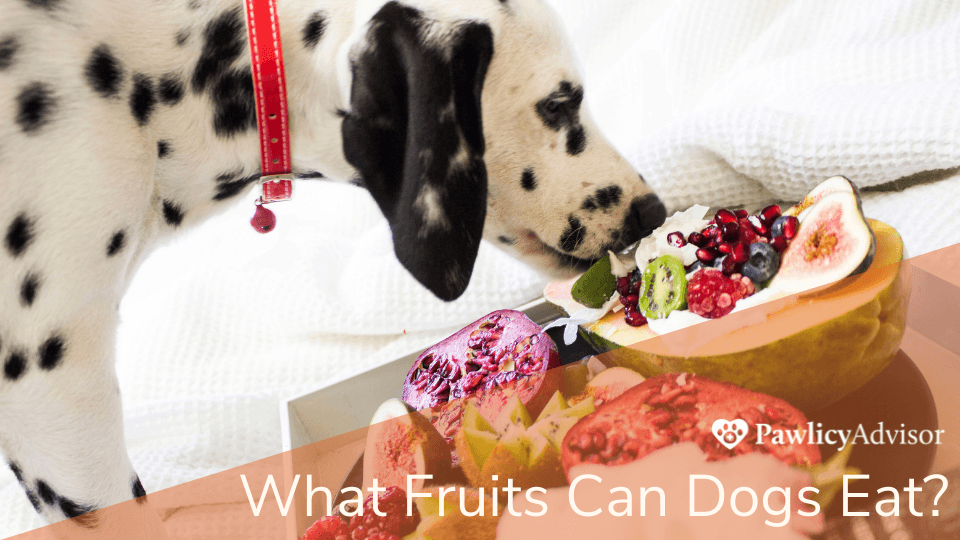Does your dog look at you with those puppy eyes while eating your daily dose of fruit? Resisting that gaze eyes can be challenging, but be careful with what you share. Fruits can be a healthy snack for dogs, but not all fruits are safe for canine consumption. Some are higher in sugar content than others, leading to problems such as stomach upset and diarrhea, whereas others can even be toxic and dangerous to their health.
In this post, we’re offering a comprehensive list of safe fruits for dogs to eat. We'll also answer the question of "What fruits can dogs not eat," and offer some serving suggestions to help keep your pup in great health.
Table of Contents:
- Can dogs eat fruit?
- What fruits can dogs eat?
- What fruits can dogs not eat?
- What fruits can puppies eat?
- Tips on how to serve fruit for dogs
- Key Takeaways
Pro Tip: Does your dog have a habit of ingesting things they shouldn’t? With the right pet insurance plan, you’ll have peace of mind with covered vet costs in case the next time your pup gets into something that needs a medical examination.
Can dogs eat fruit?
The answer depends on the type of plant, as only some are safe for canine consumption. We know that fruit is rich in vitamins, minerals, antioxidants, and fiber, making it an excellent choice for humans, but dogs have very different nutritional requirements. Some fruits can benefit dogs by:
- Strengthening their immune system
- Reducing inflammation
- Aiding digestion
- Improving their skin and coat
However, in other cases, the risks associated with dogs eating fruit can far outweigh the potential benefits. For example, doing so could cause dog diarrhea, constipation, diabetes, or food poisoning (toxicosis).
Food poisoning in dogs can be fatal if it leads to acute liver failure, so it’s crucial for pet parents to become familiar with the list of foods dogs can and can’t eat.
What fruits can dogs eat?
Dogs can eat certain types of fruit, so long as they’re served on occasion and in moderate amounts. Many dogs enjoy snacking on healthy, fruity treats between meals. Still, you should only let them indulge from time to time to avoid the risk of adverse side effects.
So, what are some of the best fruits to feed dogs? The list below covers some of the safest fruits for canine consumption, but remember to always check in with your veterinarian before introducing new foods to your pet’s diet.
Apples
Apples are great for dogs are chock-full of vitamin C, calcium, phosphorus, and dietary fiber. You can safely feed them to your dog, but make sure to remove the seeds because apples can contain small amounts of cyanide. Cut the apple into smaller pieces to make it easier for your pet to chew and digest.
Bananas
Bananas are rich in potassium, biotin, vitamins, and fiber. However, they’re also pretty high in sugar, so only serve them in small amounts. Banana peels are difficult for dogs to digest and might cause intestinal blockage, so it’s best to keep them away from your pup. If your pet eats a banana peel, you don’t have to panic right away. Just keep an eye on them and go to the vet at any signs of distress.
Blueberries
Blueberries are good for dogs because they're loaded with vitamin C, antioxidants, phytonutrients, and dietary fiber. This superfruit make an excellent training treat, but, as with all treats, they should make up no more than 10% of your dog’s daily calorie intake.
Strawberries
Strawberries are another great alternative to store-bought dog treats. Rich in vitamin C and antioxidants, they help strengthen your dog’s immune system and slow the aging process. On the flip side, these bright red berries are high in sugar, so be sure to serve them in moderation. They can also cause an allergic reaction in some dogs, so make sure to be extra careful when feeding them to your pet.
Raspberries
Raspberries are low in calories but rich in antioxidants, potassium, copper, manganese, iron, magnesium, folic acid, and fiber. These tiny red berries are one of the best fruits for dogs in their late years due to their anti-inflammatory properties. However, it’s important to note that raspberries contain one of the highest levels of xylitol. Xylitol is a natural sweetener found in many fruits and veggies, as well as other human food products, but toxic to animals in high doses. Raspberries aren’t necessarily harmful to dogs, but you should definitely serve them in moderation (less than one cup a day should be plenty).
Blackberries
Blackberries are rich in antioxidants, as well as vitamins A and C, making them an excellent fruit for dogs’ immunity and skin. As with the other fruits on this list, make sure to feed them in moderate quantities because too many could cause stomach upset.
Cranberries
Cranberries are safe for canine consumption, but only in moderation to avoid GI issues. These nutritious berries are naturally acidic and a great fruit choice for dogs with urinary tract infections (UTIs). However, never feed your pet store-bought mixtures of raisins and cranberries because raisins are highly toxic to dogs.
Apricots
Apricots are safe for dogs, but just like with apples, you’ll want to remove the pit before offering an one to your dog. Not only can apricot pits lodge in your dog’s intestine and cause a blockage, but they also contain traces of cyanide which can be very harmful. Your dog would have to consume a significant number of pits in a relatively short time to be affected by the cyanide present in them. Nonetheless, it’s best to stay on the safe side and keep apricot pits off-limits.
Oranges
Many dogs like oranges and can safely eat them in moderation. Although dogs can eat oranges safely, this are quite high in sugar that’s known to cause GI upset. Be sure to remove the peel, seeds and only feed the juicy orange flesh.
Peaches
Peaches in dogs provide an excellent source of vitamin A and dietary fiber. However, just like all stone fruits, remember to remove the pit before feeding a peach to dogs due to the possible intestinal blockage and traces of cyanide and. Also, avoid feeding dogs processed or canned peaches. These contain added sugars that can cause diarrhea and stomach upset.
Pears
Pears are full of contain fiber, copper, and immunity-boosting vitamin C, vitamin K, an essential aid to blood clotting. Remove the pear seeds before serving and steer clear of canned pears due to the high sugar content.
Mangoes
Dogs can eat mango, a tropical fruit packed with nutrients like carotenoids, fiber, and potassium, plus vitamins A, B6, C, and E. It’s best to remove the skin, which is difficult for dogs to digest. Mango pits present a severe choking hazard due to their size, so be sure to remove them, as well, before serving to pets.
Pineapples
Pineapples are a great source of vitamins C and B6, riboflavin, thiamin, niacin, and folate, making them a wonderful treat for dogs. However, they also contain a significant amount of sugar that can cause digestive issues like diarrhea. Only to serve the fleshy part of the fruit after removing the peel and crown.
Coconut
Coconut meat and coconut oil can be great for dogs. Both have powerful anti-inflammatory properties that can help with many conditions, including skin allergies, inflammatory bowel disease (IBD), and arthritis. However, the triglycerides in coconut can be unsuitable for dogs with sensitive stomachs and those prone to pancreatitis. The fruit is also high in calories, so overweight dogs should choose alternative options.
Kiwi
Also known as Chinese gooseberry, this fruit is brimming with vitamin C, potassium, fiber, plus antioxidants that strengthen the immune system and protect against cancer. Eating kiwi can also contribute to a healthy digestive system and rejuvenate the skin.
Cantaloupes
Cantaloupes are an excellent source of vitamins A, B6, C, potassium, niacin, folate, and fiber. However, they’re also relatively high in sugar and should therefore be fed in moderation, especially in overweight dogs and dogs with diabetes. The seeds are harmless but be sure to remove the outer shell as it can cause digestive issues.
Watermelon
Watermelons are low in calories and rich in vitamins A, C, B6, as well as minerals like potassium. This juicy fruit is also an excellent way to help your stay pet hydrated during the summer due to its high water content. Be sure to remove the seeds and rind them before feeding watermelon to your pup.

What fruits can dogs not eat?
While many fruits are safe and even beneficial for our four-legged friends, others should be avoided. The list of fruits not suitable for dogs includes:
Lemons and other citrus fruits
The fleshy part of citrus fruits like lemons, limes, and grapefruits are quite acidic and can cause stomach upset. The peel of all citrus fruits presents a choking hazard and can also cause GI issues.
Avocado
While small amounts of avocado flesh won’t hurt your dog, other parts of the fruit (skin, leaves, and stem) contain persin, a substance that is toxic to dogs. Symptoms of persin toxicity include diarrhea and vomiting. If your dog accidentally ingests these parts of the avocado fruit, call your vet right away.
Grapes and raisins
Both grapes and raisins are toxic to dogs. Even if fed in small amounts, they can cause kidney failure in some dogs. The reason for this is unclear, but some experts believe that they contain traces of mold that’s toxic to dogs. If your dog consumes these fruits accidentally, call your vet immediately.
Figs
Figs are very high in fiber which can cause diarrhea in your dog. If you decide to feed figs, be sure to limit their intake to one or two per week. The reason for this is because the fig plant contains a toxin called ficin, which is toxic if ingested or in contact with the dog’s eyes, mouth, or skin. If your dog exhibits symptoms like diarrhea, vomiting, drooling, or abdominal pain after ingesting parts or a fig plant, be sure to take them to the vet.
Dates
Even though dates aren’t toxic to dogs, you should avoid offering them as a treat. First of all, ingesting whole dates together with the pits can result in bowel obstruction. Second, dates are quite high in sugar and dietary fiber, so consuming more than a few can cause diarrhea.
Cherries
While cherry flesh is tasty, there’s not much of it compared to the size of the pit. Chances are, if your pup indulges in cherries, they will swallow them whole. Not only do the pits contain traces of cyanide, but they can also cause bowel obstruction.
Plums
Similar to dates and cherries, the main concern with plums is associated with the ingestion of the pit. The pits can be sharp and easily damage your pet’s esophagus, stomach, or intestines. There’s also a risk of the pit obstructing the intestinal tract, especially in smaller dogs. Finally, if the pit is crushed, it can release cyanide, which is toxic to dogs. The plum flesh is not harmful unless it’s fermented, rotten, or moldy. The flesh also contains high amounts of sugar and should be fed in small amounts.
Hedgerow berries
While some berries, such as strawberries and blueberries, are safe and even beneficial for dogs, others growing in the hedgerows should be avoided. Juniper, holly, elderberries, and rowan are all harmful or poisonous and therefore should not be offered to our canine friends.
Dried fruits
When fruits are dried, the water gets removed, and sugars get concentrated, making them unsuitable for dogs. In addition, store-bought dried fruits can contain chemical compounds that are potentially toxic to dogs. At best, your dog could suffer from vomiting and diarrhea, and, at worst, dried-fruit poisoning can result in kidney failure.
Pro Tip: The value of pet insurance can be a lifesaver in case of food poisoning. When faced with expensive vet bills, dog owners who have insurance are better prepared to provide the best care for their dogs without worrying about how it will affect their finances.
| GOOD Fruit For Dogs | BAD Fruit For Dogs |
|---|---|
| Apples | Lemons |
| Bananas | Avocado |
| Blueberries | Grapes |
| Strawberries | Figs |
| Raspberries | Dates |
| Blackberries | Cherries |
| Cranberries | Plums |
| Apricots | Hedgerow berries |
| Oranges | Dried fruits |
| Peaches | Acidic citruses |
| Pears | |
| Mangoes | |
| Pineapples | |
| Coconut | |
| Kiwi | |
| Watermelon | |
| Cantaloupes |
What fruits can puppies eat?
Small pieces of dog-safe fruits, such as apples, bananas, strawberries, watermelon, mangoes, and blueberries, make delicious and healthy treats for small puppies. However, keep in mind that treats shouldn’t make up more than 5% of your puppy’s diet, so they should only be given in small amounts and on occasion.
It’s best to feed your puppy a commercial puppy food, which includes meats, grains, fats, fruits, and veggies. This food should be your puppy’s main diet until they reach one year old. Consult with your veterinarian about the proper nutrition for your furry baby and whether it is safe to feed them the fruits included on our dog-safe list.

Tips on how to serve fruits for dogs
Whether you’re looking for new, healthier treats for your dog or want to supplement their diet with some low-fat, vitamin-rich foods, adding fruits is a great way to rev up their usual meals and treats. Here are some tips to help you safely feed fruit to your canine friend.
-
Introduce gradually. Even the fruits that made our ‘safe’ list should be introduced slowly. Serving a bowl full of fruits straight away can give your dog an upset stomach, so start small. Give your dog a small piece and if there’s no reaction, increase the amount over time.
-
Serve in moderation. Fruits are good for dogs only if fed in moderate amounts. Serving too much can have an adverse effect, especially in the case of high-sugar fruits like bananas and strawberries.
-
Prepare carefully. Be sure to thoroughly wash or no remove the peel from any fruit you will be offering to your pet. Don’t forget to remove the seeds and pits in fruits like apples, pears, avocados, apricots, peaches, and mangoes. Finally, cut the fruit into small pieces to make it easier for your doggy to chew and digest.
-
Check for mold. Moldy and rotten fruits are just as bad for dogs as they are for us. If you grow fruit trees in your garden or backyard, make sure your pet doesn’t eat spoilt fruit that has fallen on the ground.
-
Be sure that the fruit you’re giving to your furry friend is on the dog-safe list. If you’re not sure whether a certain fruit is a good choice for your pet, your vet is always the best source of information and advice.
Key Takeaways
-
Fruits offer a number of health benefits for dogs, including a stronger immune system, shinier coat, etc.
-
Be careful to avoid fruits that are dangerous or toxic to dogs, such as grapes, raisins, avocados, and dried fruits.
-
Feed fruit in moderate amounts, especially at the beginning, in order to allow your pet’s stomach to adapt and to avoid adverse reactions.
-
If you notice anything out of the ordinary after your dog has eaten fruit, be sure to contact your vet.
